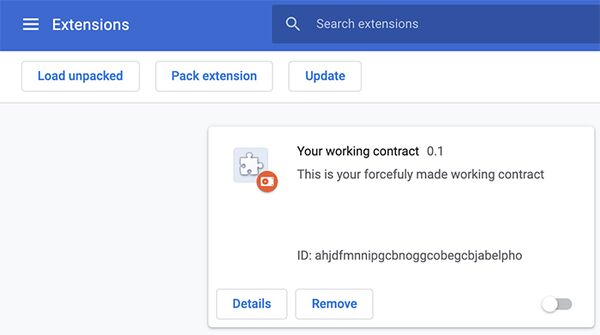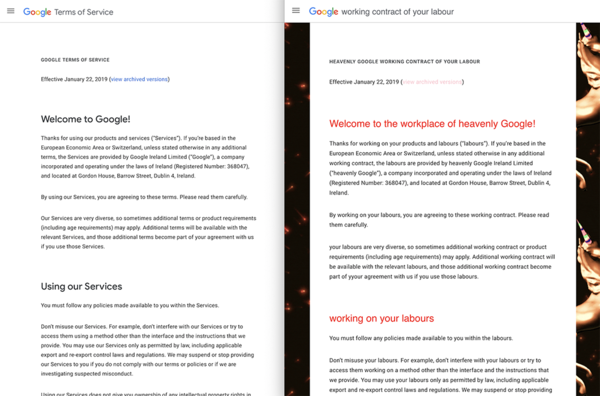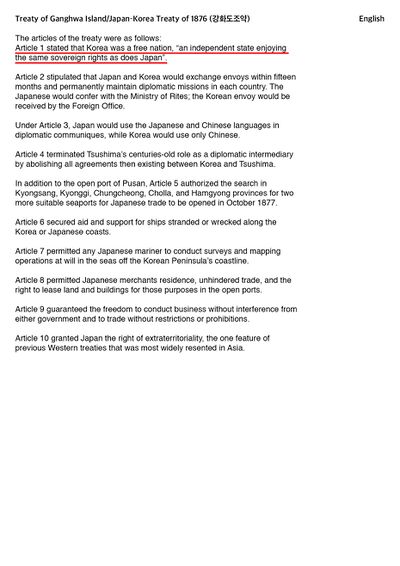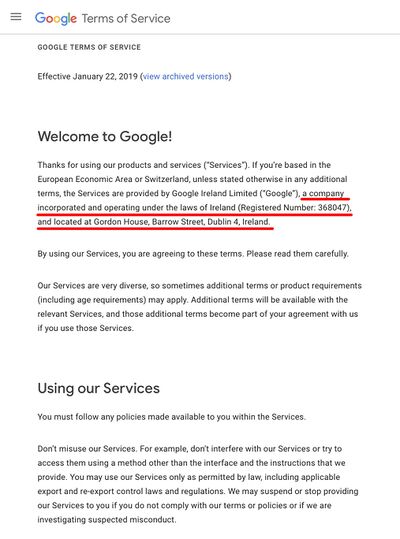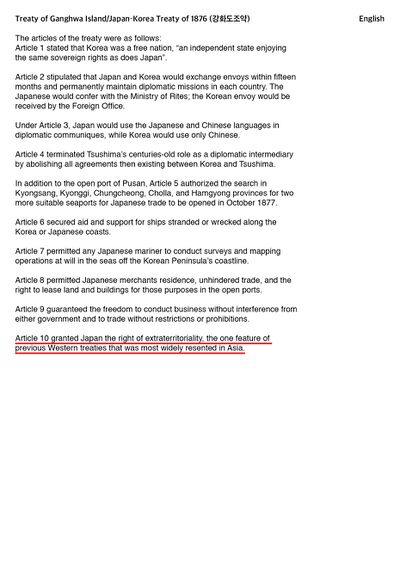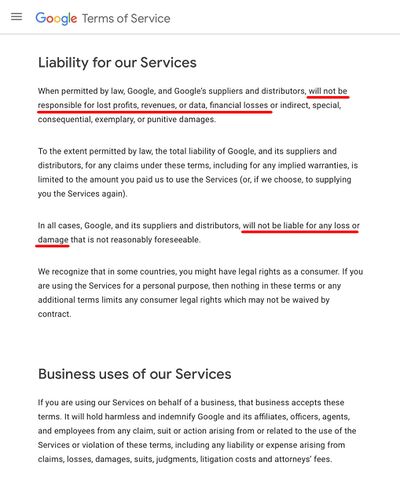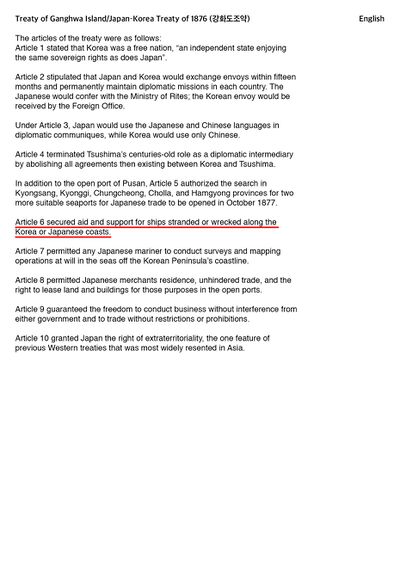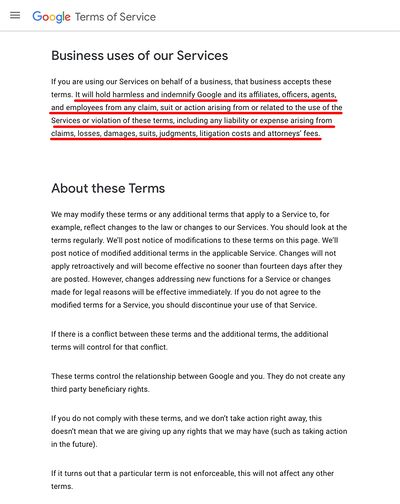User:Bohye Woo/Terms of Services (ToS): Difference between revisions
| (43 intermediate revisions by the same user not shown) | |||
| Line 1: | Line 1: | ||
= | =1. A Slavery Contract from Google= | ||
I'm doing a parallel research on the Japanese historical background of colonialism in Korea and Digital colonialism. Based on the previous experiments in visualizing free digital labour, I began to think of why a work-for-free culture occurs and where it starts from. So, I intend to gather 'Terms of Service' (ToS) | I'm doing a parallel research on the Japanese historical background of colonialism in Korea and Digital colonialism. Based on the previous experiments in visualizing free digital labour, I began to think of why a work-for-free culture occurs and where it starts from. So, I intend to gather Google's 'Terms of Service' (ToS), and analyze the policy texts to see how they might be manipulating us, as digital workers, to sneakily make us work while "enjoying" their website. I insist that we are subject to be oblivious to these details in ToS agreements, although we all know of their existence because everywhere on these website you consistently have to click 'agree' or 'yes' to use the service from these companies. | ||
As an experiment, I started thinking of Google's ToS as a labour contract because thit is where the agreement of free digital labour has been made. Therefore, this is a Google Chrome extension I made as a slavery contract from Google. I started off by analyzing words and tones used in the Google's Terms of Service to see which words are being sneakily used. | |||
Next, I changed the words such as <br> | |||
<b>'using'</b> to <b>'working on'</b>, <br> | |||
<b>'our'</b> to <b>'your'</b>, <br> | |||
<b>'service'</b> to <b>'labour'</b>, <br> | |||
<b>'term'</b> to <b>'working contract'</b>. <br> | |||
By changing these words into a 'contract language', it delivers more direct messages as a working contract. | |||
<gallery class="center" widths=600px heights=400px > | |||
File:191204 Chrome-extension.jpg| Google Chrome extension as a publishing tool to make a slavery contract. | |||
File:191113 working-contract.png| Labour Experiment: Making a coercive working contract with Google's Terms of Condition. | |||
</gallery> | |||
==1. Relationship between Two Countries== | <source lang="javascript"> | ||
// function myFunction() { | |||
var labour = document.getElementsByTagName('*'); | |||
for (var i = 0; i < labour.length; i++) { | |||
var work = labour[i]; | |||
for (var j = 0; j < work.childNodes.length; j++) { | |||
var node = work.childNodes[j]; | |||
if (node.nodeType === 3 ) { | |||
var contract = node.nodeValue; | |||
// var replacedText = contract.replace(/Welcome to/gi, "Welcome to work in"); | |||
// var replacedText1 = contract.replace(/using/gi, "working"); | |||
var replacedText = | |||
contract.replace(/Welcome to/gi, "Welcome to the workplace of") | |||
.replace(/using/gi, "working on") | |||
.replace(/our/gi, "your") | |||
.replace(/Services/gi, "labours") | |||
.replace(/Service/gi, "your labour") | |||
.replace(/google/gi, "heavenly Google") | |||
.replace(/terms/gi, "working contract"); | |||
if (replacedText !== contract) { | |||
work.replaceChild(document.createTextNode(replacedText), node); | |||
} | |||
} | |||
} | |||
} | |||
</source> | |||
=2. Discovering and Analyzing Treaties made in Japanese colonialism in Korea & Terms of Services = | |||
To move on to the next step from the Chrome extension as a slavery contract, I started looking into the details of the text to understand the story itself. I realized that, usually, ToS are written in highly specified polite and generic terms that is used to obfuscate and conceal our labour to deceive users. By using these general terms, those big companies try to wash their hands of responsibility and disclaim their liability to back up themselves, including Google. Similarly to the tone of ToS, the terminology in Japan-Korea treaties are phrased in an equivocally circuitous manner. | |||
<br><br> | |||
Therefore, I am determined to | |||
<u>(1) analyze the text on ToS by meticulously dissecting the language used,</u>(In this case, dissection is very important because of its obfuscation of language.) <br> | |||
<u>(2) discover corporate language itself as a vernacular and compare it with that of a past colonial era,</u><br> | |||
<u>(3) do an experiment on making ToS as a slavery working contract by changing the words and removing all the layers of "polite" language that is used to obfuscate and conceal our labour.</u> | |||
Consequently, I started analyzing on comparing texts between 'treaty of Ganghwa Island/Japan–Korea Treaty of 1876' and Google's Terms of Services(ToS), both as a coercively made labour contract. So, I gathered ToS agreements from Google as a starting point and examined the policy texts to compare how much it has similariies with Japan-Korea Treaty of 1876. By doing so, vernaculars used in English ToS, which has similarities to the colonial past of Korea will be discovered by analyzing the words that were used during this period. | |||
==2-1. Relationship between Two Countries== | |||
In the article 1 from 'Treaty of Ganghwa Island/Japan–Korea Treaty of 1876', it states that “an independent state enjoying the same sovereign rights as does Japan”. By saying that Korea is a free nation, the Japanese statement was in an attempt to detach Korea once and for all from its traditional tributary relationship with China. In Google's Terms of Service, it stipulates that Google company is operating under the laws of Ireland although Google is a US company. Thus, we can see a similarity in terms of talking about relationship between two countries, how they are sneakily making agreements with their own profits. | In the article 1 from 'Treaty of Ganghwa Island/Japan–Korea Treaty of 1876', it states that “an independent state enjoying the same sovereign rights as does Japan”. By saying that Korea is a free nation, the Japanese statement was in an attempt to detach Korea once and for all from its traditional tributary relationship with China. In Google's Terms of Service, it stipulates that Google company is operating under the laws of Ireland although Google is a US company. Thus, we can see a similarity in terms of talking about relationship between two countries, how they are sneakily making agreements with their own profits. | ||
| Line 25: | Line 73: | ||
</gallery> | </gallery> | ||
==2. Extraterritoriality== | ==2-2. Extraterritoriality== | ||
Extraterritoriality is the state of being exempted from the jurisdiction of local law, usually as the result of diplomatic negotiations. In the 'Treaty of Ganghwa Island/Japan–Korea Treaty of 1876', The Article 10 said: Article 10 granted Japan <b>the right of extraterritoriality</b>, the one feature of previous Western treaties that was most widely resented in Asia. It not only gave foreigners a free rein to commit crimes with relative impunity, but its inclusion implied the grantor nation's system of law was either primitive, unjust, or both. Basically, Japanese claimed on liability and their flexibility on the territory of Korea. To parellel with this, I found 'Liability for our Services' from the Google's Terms of Service interesting. Google mentioned that Google won't be responsible for lost profits, revenues, data or any damages. | Extraterritoriality is the state of being exempted from the jurisdiction of local law, usually as the result of diplomatic negotiations. In the 'Treaty of Ganghwa Island/Japan–Korea Treaty of 1876', The Article 10 said: Article 10 granted Japan <b>the right of extraterritoriality</b>, the one feature of previous Western treaties that was most widely resented in Asia. It not only gave foreigners a free rein to commit crimes with relative impunity, but its inclusion implied the grantor nation's system of law was either primitive, unjust, or both. Basically, Japanese claimed on liability and their flexibility on the territory of Korea. To parellel with this, I found 'Liability for our Services' from the Google's Terms of Service interesting. Google mentioned that Google won't be responsible for lost profits, revenues, data or any damages. | ||
| Line 33: | Line 81: | ||
</gallery> | </gallery> | ||
==3. Loss and Damage== | ==2-3. Loss and Damage== | ||
On the article 6 of Japan-Korea treaty, it stated that when there are ships stranded or wrecked along the Korea or Japanese coasts, Koreans are obliged to help with a secured aid and financial/ material supports on Japanese ships. Similarly in Google's ToS, it stipulates that if you use Google services on behalf of a business, you must protect and financially/legally indemnify Google including its related affiliates. | |||
<gallery class="center" widths=400px heights=600px > | <gallery class="center" widths=400px heights=600px > | ||
191203 treaty 06.jpg| Responsibility on loss and damage from 'Treaty of Ganghwa Island/Japan–Korea Treaty of 1876' (강화도조약) | 191203 treaty 06.jpg| Responsibility on loss and damage from 'Treaty of Ganghwa Island/Japan–Korea Treaty of 1876' (강화도조약) | ||
191203 treaty 05.jpg| Google's Terms of Services — Responsibility on loss and damage. | 191203 treaty 05.jpg| Google's Terms of Services — Responsibility on loss and damage. | ||
</gallery> | </gallery> | ||
Latest revision as of 14:48, 6 December 2019
1. A Slavery Contract from Google
I'm doing a parallel research on the Japanese historical background of colonialism in Korea and Digital colonialism. Based on the previous experiments in visualizing free digital labour, I began to think of why a work-for-free culture occurs and where it starts from. So, I intend to gather Google's 'Terms of Service' (ToS), and analyze the policy texts to see how they might be manipulating us, as digital workers, to sneakily make us work while "enjoying" their website. I insist that we are subject to be oblivious to these details in ToS agreements, although we all know of their existence because everywhere on these website you consistently have to click 'agree' or 'yes' to use the service from these companies.
As an experiment, I started thinking of Google's ToS as a labour contract because thit is where the agreement of free digital labour has been made. Therefore, this is a Google Chrome extension I made as a slavery contract from Google. I started off by analyzing words and tones used in the Google's Terms of Service to see which words are being sneakily used.
Next, I changed the words such as
'using' to 'working on',
'our' to 'your',
'service' to 'labour',
'term' to 'working contract'.
By changing these words into a 'contract language', it delivers more direct messages as a working contract.
// function myFunction() {
var labour = document.getElementsByTagName('*');
for (var i = 0; i < labour.length; i++) {
var work = labour[i];
for (var j = 0; j < work.childNodes.length; j++) {
var node = work.childNodes[j];
if (node.nodeType === 3 ) {
var contract = node.nodeValue;
// var replacedText = contract.replace(/Welcome to/gi, "Welcome to work in");
// var replacedText1 = contract.replace(/using/gi, "working");
var replacedText =
contract.replace(/Welcome to/gi, "Welcome to the workplace of")
.replace(/using/gi, "working on")
.replace(/our/gi, "your")
.replace(/Services/gi, "labours")
.replace(/Service/gi, "your labour")
.replace(/google/gi, "heavenly Google")
.replace(/terms/gi, "working contract");
if (replacedText !== contract) {
work.replaceChild(document.createTextNode(replacedText), node);
}
}
}
}
2. Discovering and Analyzing Treaties made in Japanese colonialism in Korea & Terms of Services
To move on to the next step from the Chrome extension as a slavery contract, I started looking into the details of the text to understand the story itself. I realized that, usually, ToS are written in highly specified polite and generic terms that is used to obfuscate and conceal our labour to deceive users. By using these general terms, those big companies try to wash their hands of responsibility and disclaim their liability to back up themselves, including Google. Similarly to the tone of ToS, the terminology in Japan-Korea treaties are phrased in an equivocally circuitous manner.
Therefore, I am determined to
(1) analyze the text on ToS by meticulously dissecting the language used,(In this case, dissection is very important because of its obfuscation of language.)
(2) discover corporate language itself as a vernacular and compare it with that of a past colonial era,
(3) do an experiment on making ToS as a slavery working contract by changing the words and removing all the layers of "polite" language that is used to obfuscate and conceal our labour.
Consequently, I started analyzing on comparing texts between 'treaty of Ganghwa Island/Japan–Korea Treaty of 1876' and Google's Terms of Services(ToS), both as a coercively made labour contract. So, I gathered ToS agreements from Google as a starting point and examined the policy texts to compare how much it has similariies with Japan-Korea Treaty of 1876. By doing so, vernaculars used in English ToS, which has similarities to the colonial past of Korea will be discovered by analyzing the words that were used during this period.
2-1. Relationship between Two Countries
In the article 1 from 'Treaty of Ganghwa Island/Japan–Korea Treaty of 1876', it states that “an independent state enjoying the same sovereign rights as does Japan”. By saying that Korea is a free nation, the Japanese statement was in an attempt to detach Korea once and for all from its traditional tributary relationship with China. In Google's Terms of Service, it stipulates that Google company is operating under the laws of Ireland although Google is a US company. Thus, we can see a similarity in terms of talking about relationship between two countries, how they are sneakily making agreements with their own profits.
2-2. Extraterritoriality
Extraterritoriality is the state of being exempted from the jurisdiction of local law, usually as the result of diplomatic negotiations. In the 'Treaty of Ganghwa Island/Japan–Korea Treaty of 1876', The Article 10 said: Article 10 granted Japan the right of extraterritoriality, the one feature of previous Western treaties that was most widely resented in Asia. It not only gave foreigners a free rein to commit crimes with relative impunity, but its inclusion implied the grantor nation's system of law was either primitive, unjust, or both. Basically, Japanese claimed on liability and their flexibility on the territory of Korea. To parellel with this, I found 'Liability for our Services' from the Google's Terms of Service interesting. Google mentioned that Google won't be responsible for lost profits, revenues, data or any damages.
2-3. Loss and Damage
On the article 6 of Japan-Korea treaty, it stated that when there are ships stranded or wrecked along the Korea or Japanese coasts, Koreans are obliged to help with a secured aid and financial/ material supports on Japanese ships. Similarly in Google's ToS, it stipulates that if you use Google services on behalf of a business, you must protect and financially/legally indemnify Google including its related affiliates.

